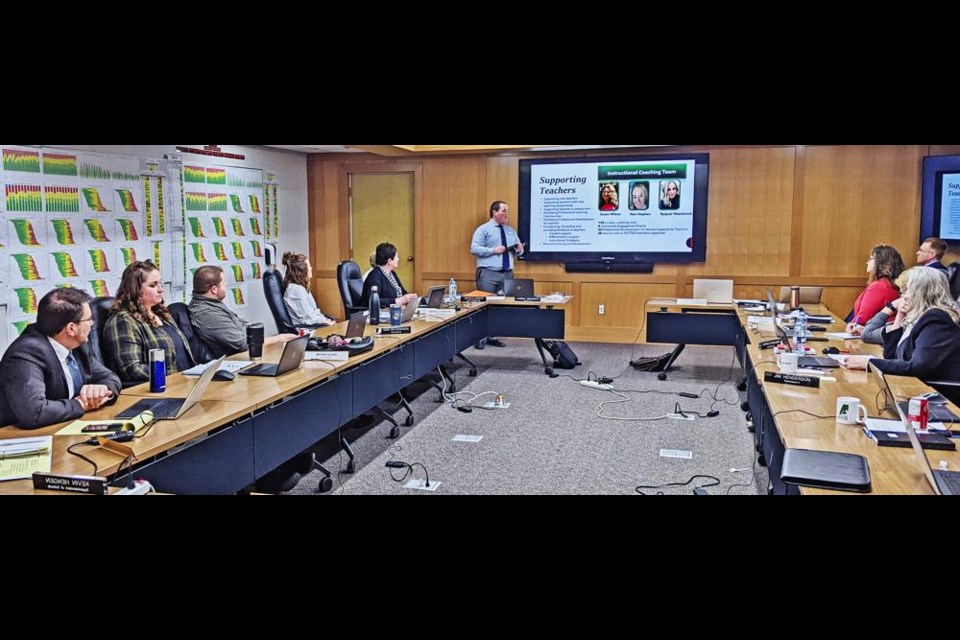WEYBURN – A number of supports are in place to help teachers in Southeast Cornerstone School Division, including the use of infant simulators, and instructional coaches, along with professional development days and other courses.
Michael Graham, curriculum coordinator for Cornerstone, made a presentation to the board of trustees on Thursday afternoon, including bringing in an infant simulator or “robot baby” to show what is being used.
He told the board he looked into the possibility of purchasing the infant simulators after coming across a student who was carrying a bag of flour dressed up with a diaper, as part of one of her classes.
He initially bought three of the simulators, and they had a lot of success with them at the Weyburn Comp, McNaughton High School and in Carnduff.
As demand grew, they have since been used at the Estevan Comp, Yellow Grass School and Oxbow Prairie Horizons, with requests from other schools, and Graham has subsequently purchased a couple more of the simulators.
They have been used in the Psychology 30 classes, as well as Life Transitions 20 and 30 classes, he said.
Holding one of the robotic babies, he noted they have sensors that will let a student know when the baby needs feeding or a diaper change, and they come with a car seat that also has sensors. The sensors tell the student when the "baby" is hungry, when to feed the "infant", how long for and how often.
"We're only in year 2 with the babies. We have to make sure we're making good experiences for the students and meeting the outcomes for the courses," said Graham, noting they will also be able to use them with expectant teen parents.
The board was provided feedback from a WCS student, who said, “Overall, this was an amazing experience. I noticed a lot of changes not only within myself, and mood, but also socially. I spent every second of the five days with Keith, and people would hold doors open for me, and walking downtown was a huge change.”
She added her boyfriend was initially against her carrying around a $3,000 robot baby, “but within hours he would try and calm the baby, and was committed to this idea.”
The student added there were challenges as it impacted on her daily life.
“My biggest struggle with this experiment was doing things for myself, such as showering, cooking, cleaning, etc. It seemed like (the baby) would wait until the most inconvenient times to cry. I can’t even imagine how stressful it is on real mothers. I think everyone should experience this. I feel it could be very beneficial,” she said.
In other supports, teachers are provided with an instructional coaching team, which includes Susan Wilson, Pam Stephen and Raquel Oberkirsch. Between the three, there have been 134 in-class coaching visits as they worked one-on-one with teachers, along with eight community engagement events with First Nations partners in their home communities, and 32 professional development inservice supports.
Wilson and Stephen have also supported 38 new, or new to Cornerstone, teachers, or teacher in new subject areas.
In coaching teachers, they co-planned, modeled and provided feedback to eachers with content support, differentiation support and instructional strategies, said Graham, along with resource sharing and development.
In building “thinking classrooms” in math, for Grades K-12, there have been three PD events, with 10 teacher participants at Moosomin, Weyburn, Estevan, Gladmar, Maryfield and Cyber Stone, along with six teacher participants that were school-supported in Carnduff, Moosomin, Radville and Wawota.
There were 10 teacher participants that were part of Southeast Cornerstone professional learning communities in Carnduff, Estevan, Weyburn, Moosomin, Radville, Rocanville, Oxbow and Wawota.
The school division also supported teacher mentorship, with 15 in the current school year, the highest number since the 2015-16 school year, noted Graham, who said mentors support new teachers or teachers in new areas, used play-based learning, cross-curricular instruction, multi-graded classrooms and small group instruction.
Some of the content areas for the professional learning communities included using AutoCAD in high school math and art; middle years robotics and automation; gender and sexual diversity; the science of reading; teacher clarity, and administration in small schools.
Graham held accreditation seminars for teachers of math and science courses, to enable them to deliver final exams at their high schools. He had 20 initial applicants plus seven external to Cornerstone, and had three renewal applications plus 10 external applicants.
The total cost of the accreditation was $36,316, but with fees paid by the external applicants, the school division saved $12,801 in the costs.






